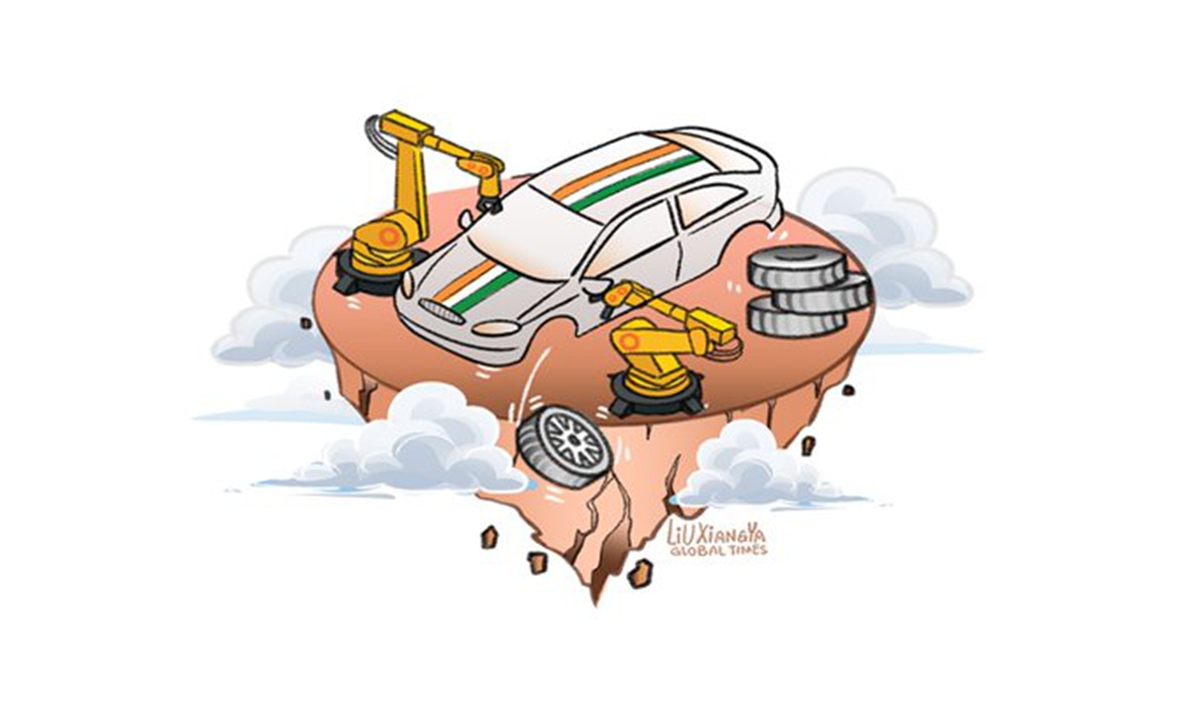
Illustration: Liu Xiangya/Global Times
While the US is attempting to persuade European countries and others to join its concocted "overcapacity" offensive against China's new-energy industries and green products, American propaganda tools have begun hyping "potential dumping" of Chinese products in the Indian market in an attempt to discredit Chinese new-energy products and incite fear and hostility among Indian businesses toward Chinese technology and products.
The US' latest round of tariffs imposed on Chinese imports, including electric vehicles (EVs), computer chips and medical products, have caused some concern in India that Chinese exporters may "dump" products in the Indian market, Voice of America (VOA) claimed on Wednesday.
The US media is trying to create anxiety among Indian businesses, attempting to drive a wedge between China and India, so as to stymie mutually beneficial economic cooperation between the two nations, and drag India into the US' small circle of suppressing Chinese EVs and other emerging industries. The bad faith of the US media is evident for everybody to see.
There is vast potential for cooperation between China and India in areas such as EV batteries, computer chips, and medical products. This collaboration could lead to significant advancement in technology and industrial development for both countries.
Taking the EV industry for an example, an Indian think tank released analysis in March that the Indian government's efforts to promote the country as a center for EV manufacturing may lead to a significant increase in imports of Chinese auto components.
In March, New Delhi introduced a series of strategic initiatives to enhance India's capabilities in EV manufacturing. India is confident that its new EV policy measures will open up the market to more global players, according to Rajesh Kumar Singh, the country's secretary at the Department for Promotion of Industry and Internal Trade.
Just as India announced a new initiative to develop its domestic EV industry, some Indian think tanks sounded alarm that Chinese companies may benefit from this initiative.
However, the reality is that Chinese companies, Chinese technology and Chinese investments have played a very positive role in promoting the development of the Indian economy. If India insists on avoiding Chinese technology and products, it will undoubtedly have a negative impact on the development of its manufacturing industry.
China plays a crucial role in global cooperation when it comes to the new-energy industry chain, as Chinese companies are producers of good quality spare parts, especially for the EV supply chain. Currently, India imports a large number of automotive components from China.
Evidently, the under-developed EV supply chains in India could present significant obstacles for its growth and manufacturing progress in the industry. China's supply chain advantages can help Indian EV makers to improve their production efficiency and reduce production costs.
Hopefully, India will not be influenced by the geopolitical games being played by the US and its media and avoid taking actions that harm its own interests. Valuing cooperation with China in industries such as EVs is the necessary path for India to revitalize its ambition in EV manufacturing.
Participating in the geopolitical games of the US and implementing protectionism will cause India to regress in lost economic and trade cooperation, inevitably delaying its ambition to revitalize the manufacturing industry. India needs to be cautious about not to fall into the trap created by American politicians.
If India wants to accelerate the revitalization of its domestic manufacturing and other industries, it needs to eliminate the interference of protectionism and geopolitical thinking on normal economic and trade cooperation, and stay away from political interventions by external forces.
Economic cooperation pledges by the US that sound good but are not practical have been exposed as unable to bring real help to the Indian economy. On the contrary, if India is willing to abandon hostility toward Chinese technology and Chinese companies, its industrial development will see much faster progress.
The author is a reporter with the Global Times. bizopinion@globaltimes.com.cn




